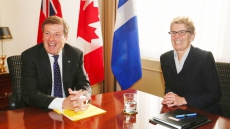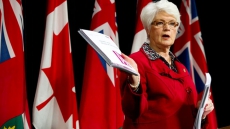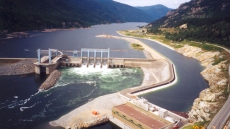OTTAWA — Polls suggesting a tight, three-way race among the main federal parties forced their leaders Tuesday to confront scenarios around a possible minority government as the post-Labour Day phase of the election campaign opened.
That raised the possibility of cross-party alliances, including the contentious coalition question, which also reared its head, as it did in last federal campaign.
But the Conservative, NDP and Liberal leaders were determined to carve some daylight between their parties.
Stephen Harper, Tom Mulcair and Justin Trudeau added economic planks to their platforms, throttling up their campaigns to full speed after more than a month of summer campaigning.
But with no breakaway front runner emerging for the Oct. 19 election, all three faced questions about whether they might try to join forces with another party if the country awakens to a minority government the next day.
Harper held firm to his anti-coalition stance, saying it was the right of the party winning the most seats to form the government.
"That's always been my view. I've lived by that and I hope that party is us," Harper said in Mississauga, Ont., where he announced a plan that would increase the government's contribution when low- and middle-income families invest in education savings plans.
The Conservative plan would see the government contribute $200 for the first $500 invested each year by a family earning up to $44,000. For a family earning up to $88,000, the government's cut would be $100.
At the same time, Harper painted his NDP and Liberal rivals as promoters of high taxes and endless deficits who would be toxic to the economy.
Campaigning in Nova Scotia and New Brunswick, Trudeau said Canadians don't want a coalition if a party wins a minority government, but reiterated his party's willingness to co-operate with other parties to pass legislation.
"We will always be open to working with others, but the fact is, Canadians aren't interested in formal coalitions," Trudeau said, before he promised major changes to the employment insurance system.
Trudeau's plan includes a reduction in premiums, more for the provinces for skills training and a reduction in wait time for a first payment to one week from two.
"One of the things that is very, very clear is that Mr. Harper has got more than 60 per cent of Canadians wanting to see someone else as prime minister," Trudeau added.
Mulcair sidestepped questions about his position on the coalition question at an event in Montreal, where he pledged new funding for the aerospace industry.
"We, of course, have raised that issue any number of times. In 2008, we went so far as to write a formal coalition agreement with the Liberals," Mulcair said.
"But as you know, they turned up their nose on their own signature and seven years later Stephen Harper is still there."
The coalition question arose Monday night when Harper was asked about the issue during an interview with CBC television.
Harper said he "would not serve as prime minister" if the Conservatives finish in second place even by a close margin.
Like Trudeau, Mulcair said he was focused on defeating the Conservatives.
Mulcair promised a $160-million fund to help small- and medium-sized aerospace companies adopt new technology and increase production to increase their global competitiveness.
Mulcair said he would lead trade delegations to major international industry events to help promote Canadian companies.




